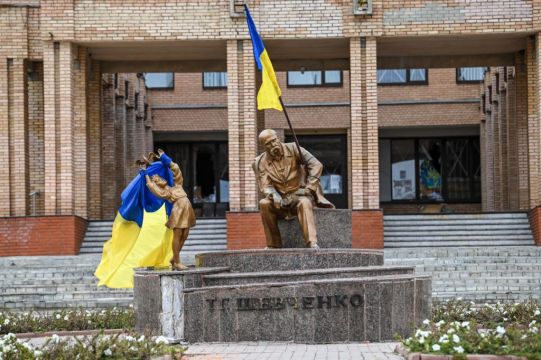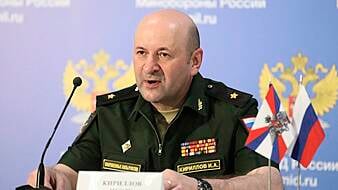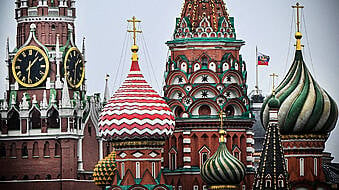Ukrainian forces swept deeper into territory seized from fleeing Russian troops on Monday and joyful residents returned to former frontline villages, while Moscow's shells rained down on Kharkiv, setting off fires across the region's main city.
Ukraine's general staff said its soldiers had recaptured more than 20 towns and villages in just the past day. Further south, they repelled attempted Russian advances in two important areas of the Donetsk region - the city of Bakhmut and Maiorsk, near the coal-producing town of Horlivka, it said in an evening update.
"People are crying, people are joyful, of course. How could they not be joyful!" said retired English teacher Zoya (76) in the now-quiet village of Zolochiv, north of Kharkiv and 18km from the Russian frontier, weeping as she described the months she had spent sheltering in the cellar.
Nastya (28) had fled the village in April but returned last week after news of Ukrainian advances. "I think everyone's in a great (mood). It's all over now. At least we hope it's all over," she said, queueing for groceries with two small children.
Vitaly Ganchev, the Russian-installed head of Moscow's occupation administration in what remained of Russian-held territory in the Kharkiv region, acknowledged that Ukrainian forces had broken through to the frontier.
'Emergency defensive actions'
Russian president Vladimir Putin and his senior officials have been silent in the face of Russian forces' worst defeat since the war's early weeks when they got repelled from the outskirts of Kyiv. Kremlin spokesman Dmitry Peskov side-stepped a reporter's question if Putin still had confidence in the military leadership.
"The special military operation continues. And it will continue until the goals that were originally set are achieved," Peskov said.
Putin was later shown on state TV chairing a meeting on the economy at which he did not mention the retreat and said Russia was holding up well in the face of Western sanctions.
"The economic blitzkrieg tactics, the onslaught they were counting on, did not work," he said.
After days of avoiding the subject, Russia's defence ministry acknowledged on Saturday it had abandoned its main stronghold in the northeast, Izium and neighbouring Balakliia, saying it was a pre-planned "regrouping".
As thousands of Russian troops pulled back, leaving behind ammunition and equipment, Russia fired missiles at power stations on Sunday causing blackouts in the Kharkiv and adjacent Poltava and Sumy regions.
Ukraine denounced the strikes as retaliation against civilian targets for Russia's military setbacks.
On Monday, Russian strikes again disrupted power and water supply in Kharkiv itself, killing at least one person, its mayor said.
Throughout the day, mass shelling of residential areas and key infrastructure sparked several fires in the city, regional emergency services said on Facebook.
"As a result of shelling five fires have broken out. Administrative buildings and construction sites caught fire as did a number of vehicles," they said, adding that the largest fire was in an apartment building, with about 100 firefighters on site. Moscow, which denies targeting civilians, did not comment, while the White House condemned the strikes and pledged its continued support for Kyiv.
In an overnight speech, Ukrainian president Volodymyr Zelenskiy said Ukrainians would rather live without gas, water, food or heat than be in Moscow's orbit.
"Cold, hunger, darkness and thirst are not as frightening or as deadly for us as your 'brotherhood and friendship'," he said, addressing Russians.
Zelenskiy has earlier said the latest offensive could mark a breakthrough in the six-month-old war, with more territorial gains possible in the winter if Kyiv received more powerful weapons.
Britain's ministry of defence said Russia had probably ordered a withdrawal from all of the Kharkiv region west of the Oskil River. That means abandoning the sole railway line that had sustained Russian operations in the northeast.
Kyiv, whose troops reached the river when they seized the railway hub city of Kupiansk on Saturday, suggested the Russians were already falling even further back.
The Ukrainian general staff said Russian troops had abandoned Svatove in Luhansk province, a town around 20km east of the Oskil. Reuters could not confirm the situation there.
Britain said Moscow was also struggling to bring reserves to the south, where Ukraine is pressing on to isolate thousands of Russian soldiers on the west bank of the Dnipro River, forcing most Russian forces to focus on "emergency defensive actions."
A spokesperson for Ukraine's southern command said its forces had recaptured 500 square km of territory in the south. The situation there could not be independently confirmed.
Unravelling
Ukrainian chief commander General Valeriy Zaluzhnyi said on Sunday his troops had retaken more than 3,000 sq km this month.
Further Russian retreats could soon put Ukrainian forces in position to attack territory Russia and its local proxies have held since 2014. Denis Pushilin, leader of the pro-Russian separatist administration in Donetsk province, acknowledged pressure from multiple directions.
"At the very least, we have stopped the enemy at Lyman," he said in a post on Telegram overnight, referring to a frontline city east of Izium. He also described fighting at Bakhmut and Vuhledar further south.
Russian broadcasters have alluded to the setbacks but struggled to explain them, with commentators demanding a redoubled war effort.
"We must win the war in Ukraine! We must liquidate the Nazi regime!" one commentator said on a panel show on NTV television.
"And how many years is that supposed to take?" replied another. "So my 10-year-old children will get a chance to fight?" -Reuters







